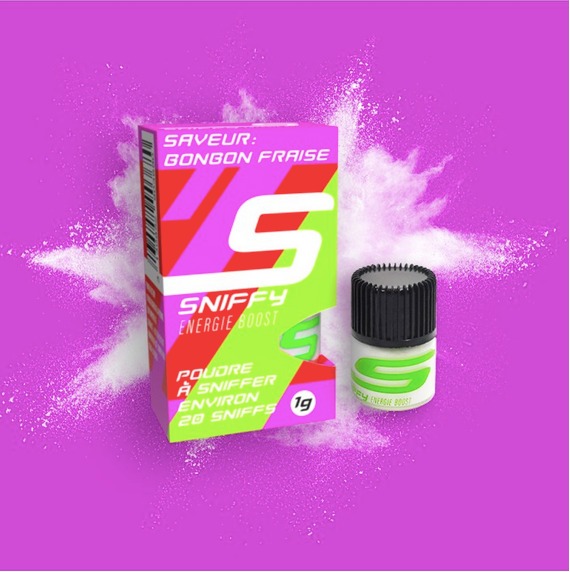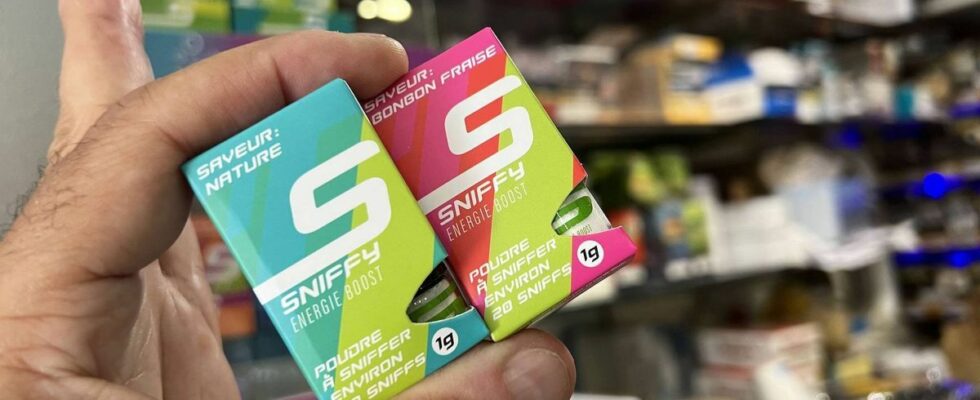Published on
Updated
Reading 3 min.
Health Minister Catherine Vautrin announced on Wednesday that she had signed a ban on the Sniffy powder, which is inhaled and marketed as an energizing product. She denounced the risk of addiction and confusion with illicit products.
Sold for months on the Internet and in some tobacconists, Sniffy is a white powder ingested by inhalation and therefore sold with a straw!), a method of consumption which is particularly reminiscent of that of cocaine.
Sniffy promises an intranasal boost
Sniffy offers a variety of flavors to give you a boost of energy for a few minutes by simply inhaling the product… through your nose. On its website, Sniffy boasted the benefits of its concept, without really hiding the “festive” concept of the product.Whether it is to stay awake and/or focused, Sniffy is the ideal product. Its virtues are multiple. Sniffy will accompany you in many situations: during your physical exercises, your studies, exams but also at night” we can read in the presentation.

For this purpose, the powder is a mixture of substances in “ine” (but not the one you are thinking of): taurine, caffeine, arginine, creatine…
“Substances that are already found in energy drinks,” confirms Dr. Kierzek, “but which we will now snort intranasally“. By this mode of administration, the effect is rapid. “This shot will have an almost immediate effect for a duration of 20 to 30 minutes.”.
A marketing ploy that lit the fuse
The arrival of this “colorful” Sniffy, sold as “fun”, is not without its problems. First of all, as our expert reminds us, the first problem is that the action is ephemeral.
“The product promises a boost but it doesn’t last. However, if you are tired, do you need a boost? What you need most is to sleep a little more, go out, do some sport or even review your diet to favor foods that give you energy.” specifies our expert.
The other problem, and the most obvious, is probably this slightly too marked resemblance with another very illegal white powder that is cocaine. The brand does not defend itself very much, and seems to play with the codes by contenting itself with a simple “A white powder that you inhale through your nose? No confusion, Sniffy is legal” on the FAQ of his site.
So of course, the powder sold does not contain anything illegal, and is only intended for those over 18. But it is difficult to have on one hand a ban on chocolate cigarettes and on the other, the authorization of a white powder to be snorted with a straw…
A ban hanging over Sniffy’s nose
Doctors and the government quickly got upset. By May, the government had expressed its intention to ban the product.My fear is that it is a very bad habit because a white powder that you start to sniff is perfectly addictive and the link with illicit products is obvious.“, explained the minister during her visit to the Necker hospital in Paris (comments reported by The Parisian). And to cut it short, the minister did not mince her words.
To proceed with the ban on “Sniffy”, the Ministry of Health relied on article L521-17 of the Consumer Code which allows it to “suspend for a period not exceeding one year the manufacture, import, export or placing on the market of a product” in the event that this represents a “serious or immediate danger“.
Published in the Official Journal this week, the decree should come into force in the coming days, although no precise date is currently known. On 3 June 2024, France had indicated to the European Commission its intention to ban this product, but the procedure had taken time, as the Commission had requested “additional clarifications” from France beforehand.
On Xthe Minister Delegate for Health, Frédéric Valletoux, also welcomed this decision.I committed to banning Sniffy energy powder, and I have done so. The ban will be published by this weekend. It is my duty to protect the younger generations.“.
